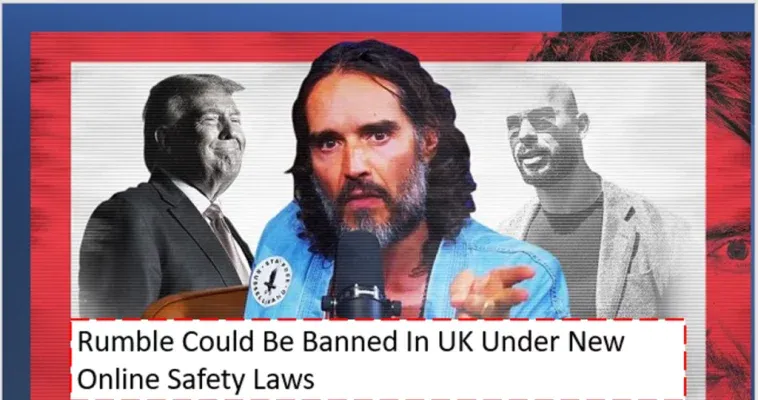(The Exposé) Rumble, the free-speech video hosting website could be banned in the UK under new online safety laws.
As reported here a couple of days ago, the Online Safety Bill was approved by the House of Lords on the 19th of September but still needs official approval from the King before it can become law. This has not deterred the government from trying to coax platforms such as YouTube, to ban Russell Brand due to allegations of historical abuse
.
Again as we reported last week, while YouTube dutifully obeyed, Rumble stayed true to their mission and responded “Although it may be politically and socially easier to join the cancel culture mob, doing so would be a violation of our companies values and mission. and finished with “We emphatically reject the UK Parliament’s demands.”
Unfortunately, now “experts” have said that Rumble, which hosts Russell Brand, could be blocked in the UK because of the Online Safety Bill.
 Rumble’s response to the government last week.
Rumble’s response to the government last week.
According to The Times: “Rumble, a video-sharing platform based in North America, has become home to Brand and other figures with extreme views, including Andrew Tate and Alex Jones, the conspiracy theorist.“
It also hosts extreme videos on race and antisemitism that mainstream platforms such as YouTube have made more of an effort to take down.
Rumble has been thrust into the spotlight after Brand used it to declare his innocence of sexual assault claims.
Under the Online Safety Bill, which is due to become law next month, Rumble will be regulated by Ofcom because it is accessible in the UK.
Brand has recognised the impact the new law could have. In a statement on Friday, he said: “The British government has asked big tech platforms to censor our online content. [This] bill . . . is a piece of UK legislation that grants sweeping surveillance and censorship powers.”
Under the new law, Rumble will have to prevent children from seeing pornography and material that promotes self-harm, suicide, or eating disorders. Violent content and material harmful to health, such as vaccine misinformation, will also have to be kept from children.
Ofcom will also draw up new guidelines on violence against women and girls that will have to be adhered to.
Rumble will also have to take down material that is illegal, such as videos that incite violence or race hate.
All these obligations will be hard for Rumble’s management to stomach, according to Lord Allan of Hallam, a former Facebook executive who has advised on the bill.
“You can’t get out of this by saying ‘I’m a crazy American platform, that’s not ok’ and that somehow you get a free pass. They don’t get a free pass,” he said. “Their whole philosophy is freedom of expression . . . a kind of ‘screw you’. So when they get a letter from Ofcom saying, ‘Here are all the things you’re going to have to do’, it seems to me the most likely reaction is going to be they’re going to say, ‘Well, we won’t operate in the UK any more.’ ”
Noncooperation could leave Rumble executives open to arrest if they came to Britain, as the bill provides for senior managers to be held criminally liable.
Professor Lorna Woods, an internet law expert who was one of the architects of the bill, said Ofcom had the ability to disrupt or block Rumble if it did not comply.
“In theory Ofcom will engage with them, and say, ‘You’re not complying with rules’, and Rumble will grandstand before the press, as we’ve seen, and try to ignore what Ofcom does,” she said.
Rumble’s defiance was evident in a row with Dame Caroline Dineage, chairwoman of the culture, media and sport select committee, on Thursday.
She asked whether the video site, on which Brand has 1.4 million followers, would join YouTube in “suspending Brand’s ability to earn money”.
Chris Pavlovski, Rumble’s chief executive, posted an open letter on Twitter/X in response that said: “Today we received an extremely disturbing letter from a committee chair in the UK parliament.”
He noted that none of the allegations against Brand related to content on Rumble, adding: “We regard it as deeply inappropriate and dangerous that the UK parliament would attempt to control who is allowed to speak on our platform or to earn a living.”
He concluded: “[Joining] a cancel culture mob . . . would be a violation of our company’s values and mission. We emphatically reject the UK parliament’s demands.” Source

The UK is a Fledgling Dictatorship
This issue goes beyond Russell Brand, Andrew Tate, or any individual who dares to voice their opposition to the WEF, WHO, or government agendas. It’s no longer solely about preserving freedom of speech or expression. Instead, it’s about depriving us of our ability to independently think, critically assess information, and draw our own conclusions.






